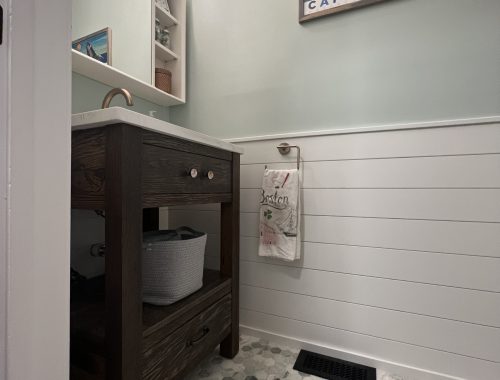
The Day He Stopped Talking
I was 46 when my dad stopped talking. I know the exact day, because I went to my first game at Wrigley field and was soaking in the glow of a Cubs win when I called home. After my mom gave the phone to my dad, there was silence. She began whispering in the background, reminding him to say “Happy Birthday” to me and gently pressing the phone into his ear so he could hear my voice. He made a sound in the back of his throat, said “Happ”…and trailed off. I know he said “Happ” and not “Hap” because he pressed on with the “pppppp” sound for a long second before he gave up. I heard the phone drop and my mom came back on to let me know he had walked away. Still present in body and soul, my dad’s brain – ravaged by dementia – had taken away a father’s birthday wish to his daughter.
The previous year my dad had written me a letter. I keep it in my beside table, slightly wrinkled from my tears, and the opening and closing of the neat tri-fold seams he made when he mailed it to me. By then I already knew something very awful was going on with his brain, but I did not know what. What I did know was that he was not the same. His beautiful letter was a sincere tribute a father makes to his daughter so that she will never forget how much he loves her. Brief and to the point, he made certain I knew how proud he was of me for my life’s work (namely, raising my three sons alone). He reminded me of how bossy I was when I was a toddler, and that he enjoyed being the guy I bossed around. My dad. My hero. The letter he wrote – while clearly “off” and signs of what was to come – is the most treasured gift I have ever received.
The early signs of my dad’s Dementia with Lewy Bodies (DLB) were chalked up to him having a hearing disorder. I remember just after my 44th birthday he shared with me that he had a hearing test. He knew something was wrong, but he was confused what it was. At that point, most of the conversations anyone had with him about it were medical/factual, and so I looked at him and asked him how he was feeling about everything. His hazel eyes became wet and gray and he said, “not good”. It would be well over a year before he was diagnosed, and like a puzzle taking shape, each terrible piece was snapping together. I believed he had a hearing disorder and hugged him (hard) and reminded him I loved him. In my naïve state I imagined what hugging him with a hearing aid would feel like. I was willing and wanting to believe there was a specific and physical problem that could be identified and corrected. I am not so sure he was.
My dad remained physically and mentally active until just months before his brain truly succumbed to the frightening symptoms of DLB. He biked, traveled, cooked, volunteered and was an extraordinary husband/father/grandfather/brother/uncle. The world was his oyster – and he sometimes prepared an enormous platters of succulent oysters for his onlooking grandchildren, with their big eyes and even bigger appetites. His progression into not talking was slowly, and yet all at once. When he first began to have trouble talking, I found that patience, positive eye contact, and small reminders prevailed. I started a weekly video chat with him and he willingly and studiously accepted the “brain homework” I gave him. He explored writing and reading poetry, drawing sketches of his dog, researching and listening to musicians, and digging up old records from the 60s. Our global pandemic provided the backdrop to house-bound activities, and he was my enthusiastic partner in creatively deciding what we could explore next. In one of our final calls, he spent ten minutes describing to me what sensations he had when picking up an almond and eating it – a homework assignment from a brain-fit group class he had done that he was excited to share with me. I was quite certain (and damn proud!) that I had reverted my dad’s DLB, and that he was going to be OK.
And then…and then suddenly he just was not. He skipped calls or showed up and only sporadically and oddly spoke. He ignored text messages or sent replies that made no sense. He slipped into a place where I could not find him. Finally, he was gone. My birthday call was the last time I heard him say anything other than “yes”, which he uses out of context and with no clear intent. Does “yes” mean “yes, I understand”? Does “yes” mean “yes, I love you too”? Or does “yes”, just mean “yes, I know you are talking”? I want to believe “yes” means “yes, you are loved my dear daughter, even when I can not tell you anymore”.
With my dad not able to talk, my world has gone quiet…and yet I am certain a new chapter has begun. When I next have the chance to see him in person, I will be quiet(er) too. I will hold his hand and sit as we watch the trees blow in the wind. I will draw simple pictures and pass him the pencil to add to it. I will put records on and smile at him, perhaps tapping a tune on his leg. I will eat almonds with him and tell him what sensations I experience. I will let him lead and be ready to follow. I know very little right now, but I do know that somewhere deep inside the mask of DLB, my dad is there. He is calling me, just not in the words I spent my life listening to. I am so grateful that I can still hear him.

Sketching a Character

Where I am Rooted
You May Also Like

Bathroom & Kitchen Remodels – Master Bathroom
January 1, 2023
Bathroom & Kitchen Remodels – Downstairs Bathroom
January 1, 2023
